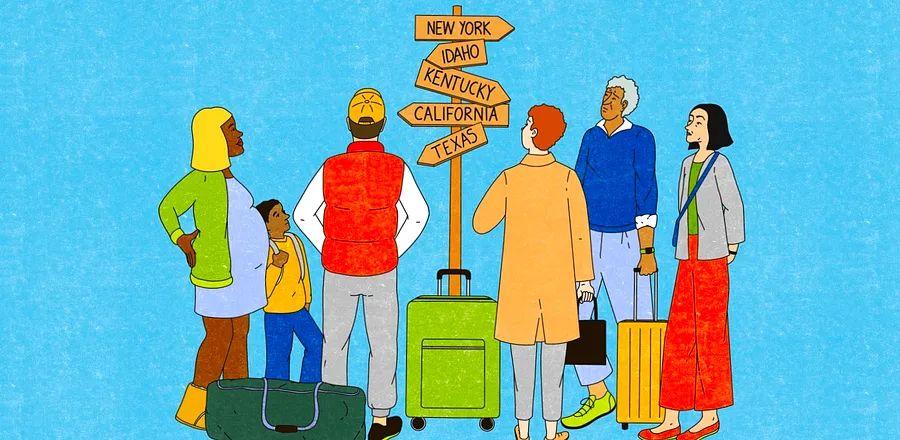How Effective Are Travel Boycotts, Really?

Kemari Ombonga and Akosua Agyepong from San Francisco faced a classic dilemma: Should they move back to Ombonga's home state of North Carolina, go to Texas to be near family, or stay in California? Ultimately, their choice hinged on the political climate of each state, particularly regarding abortion rights and gun laws. While California's living costs were higher, they felt a stronger connection to the more progressive environment.
They also discussed their travel plans in light of the recent changes to Roe v. Wade.
“It’s a complex situation,” Agyepong says, having relocated from Ghana to the United States last year. “Deciding where to travel and where to live is not straightforward.” They realized that simple solutions were hard to come by, with Ombonga pointing out that many states with strict abortion laws are located in the South, home to a large African American community that has long faced oppressive regulations. While they preferred not to relocate, avoiding family visits across Louisiana, Texas, and Florida was not an option either.
The couple runs Ashure Travel, a consultancy and management firm that assists businesses with flight bookings. In light of the recent ruling on Roe v. Wade, they chose to support their employees who might need abortion access.
“One decision that was straightforward was ensuring that all the women in our organization had safe access to their medical care and felt genuinely supported,” Ombonga states. “And not just in words, but also financially.”
He notes that the more complicated issue was expressing the company’s position without alienating staff and potential clients who may hold differing views.
“That has been challenging to navigate. However, if we must lose a few employees or clients to uphold our values, I believe that’s a minor sacrifice.”
The duo mentions they are familiar with leveraging travel as a catalyst for change—Ombonga previously volunteered with Miles4Migrants, a nonprofit that arranges travel for individuals displaced by war or conflict, and he has helped clients evacuate from hurricanes in his home state of North Carolina. He asserts that arranging travel for those seeking abortions feels no different.
How travel companies adapt to a shifting policy environment
Following the overturning of Roe v. Wade last June, the travel industry mostly refrained from engaging in the political discourse, with only a handful of airlines and companies like Airbnb openly supporting reproductive rights. Seattle's Alaska Airlines announced it would continue to cover expenses for employees seeking reproductive care.
The airline communicated to its staff in June 2022, stating, “Today's Supreme Court decision does not alter that.”
Others opted for a neutral stance. United Airlines, based in Chicago, distributed a memo to its global workforce, describing the abortion issue as “an emotional one” and urging employees to approach discussions with empathy and respect, while refraining from taking an official stance. (In Illinois, Roe v. Wade is protected by law, with Governor J. B. Pritzker asserting that “abortion will always be safe and legal here.”)
Individual travelers take a stand
The repeal of Roe exemplifies how shifts in U.S. policies impact the everyday lives of countless citizens and travelers, affecting issues like abortion rights, gun control, and LGBTQ+ rights. Travelers have numerous destinations where they can invest their time and money. What occurs when their personal beliefs clash with the policies of a destination? How do social issues influence travelers' decisions on where to go—and spend their hard-earned money—within the United States?
In the wake of states implementing trigger bans, some travelers, such as Twitter user Carolyn Higgins, who journeys across the United States in her RV, announced they would boycott states with strict abortion laws in place.
“No travel, no purchases from their major industries or biggest employers. Who’s joining me?” Higgins tweeted in May.
The idea is that traveling to a place with opposing policies suggests a level of support for those policies. Conversely, others like Twitter user Jonathan Field argue that avoiding small towns and cities unfairly impacts local residents and businesses uninvolved in creating the laws in question. Field expressed concern over the term “boycott,” which he feels disrespects the “[people] living in those areas.”
How effective are “travel boycotts”?
Consider a recent development: The NAACP issued a travel advisory for Florida this month, referencing Governor Ron DeSantis’s “aggressive efforts to erase Black history and limit diversity, equity, and inclusion initiatives in Florida schools.”
“Florida is openly antagonistic towards African Americans, people of color, and LGBTQ+ individuals,” the NAACP stated in its travel advisory. “Before planning a trip to Florida, please recognize that the state dismisses and marginalizes the contributions and struggles of African Americans and other communities of color.”
DeSantis responded to the organization, with his office labeling the advisory as “nothing more than a publicity stunt” (he also criticized the NAACP during his GOP presidential campaign launch this week).
Such a travel advisory is unlikely to deter the majority from visiting the Sunshine State, which welcomed nearly 138 million visitors last year—a record high, primarily from domestic travelers.
While both Ombonga and Agyepong feel that individual boycotts can be impactful, they believe grassroots efforts to assist marginalized communities—like canvassing and engaging in conversations—can be equally effective, if not more so.
“Boycotting is certainly one of the strategies we can employ,” Agyepong states, “but the real question is whether it will achieve the results we need.”
There’s a rich history of effective boycotts that have led to significant policy changes. The most famous in the U.S. is arguably the Montgomery Bus Boycott, which took place between 1955 and 1956, where individuals refused to use the transit system in Montgomery to protest racial segregation. While the social ramifications were evident, the financial toll on the transit system was also substantial: the strike lasted just over a year, costing the city approximately $3,000 daily and leading to about 40,000 lost bus fares each day.
Recent protests have included boycotting Trump hotels, avoiding travel to North Carolina over bathroom bills that denied transgender individuals the right to use restrooms matching their gender identity, and to Georgia due to a voting law mandating identification for absentee ballot voting. An analysis by the Associated Press revealed that the bathroom bill would have resulted in nearly $4 billion in lost revenue for North Carolina. (The bill was later repealed.)
For Kristin Luna, a travel writer and photographer in Nashville, the situation isn’t as straightforward as merely boycotting a place. She cites Kansas, where voters decisively rejected a proposed amendment to ban all abortions. Luna believes this illustrates that the actions taken within a state legislature do not always reflect the sentiments and views of the residents outside.
“Having grown up in a rural area, I recognize the significance of tourism and hospitality,” says Luna, who resides in the town housing the Jack Daniels distillery. “It’s definitely a place where many businesses would struggle to survive without tourism,” she explains. “Through my extensive travels, especially in Southern states, I’ve witnessed many small businesses thrive due to the influx of tourists each year.”
Tourism represents a $17 billion industry in Tennessee, where Luna lives, employing 150,000 people. She contends that while politicians and corporations may not feel the impact of a travel boycott, small businesses still recovering from the aftermath of the COVID-19 pandemic certainly will.
Choosing connection over boycotts
The U.S. Travel Association, a nonprofit advocating for the U.S. travel sector, maintains a strong stance against travel boycotts.
“Broad out-of-state travel boycotts won’t alter legislation, but they can devastate communities dependent on tourism,” remarks Tori Emerson Barnes from the U.S. Travel Association. “Travel restrictions harm workers in the travel industry who are not responsible for policy decisions, ultimately impacting the very groups that boycott advocates claim to champion. The essence of travel is to unite Americans, not to exacerbate divisions.”
Many states that implemented trigger bans depend on tourism to support their economies. For example, Mississippi generated over $400 million in 2021 for its general fund—funds used for state services and programs—through tourism. According to the Mississippi Development Authority, travel-related jobs ranked as the fourth largest employment sector in the state.
Instead of showing dissatisfaction with a destination's policies through boycotts, Luna encourages supporting local individuals and businesses that share your values during your visit.
“I feel we’ve reached a stage in society where people are increasingly conscious of where they spend their money,” she states. “Apply that same awareness to your travel choices.”
Deciding whether to travel to a U.S. location with policies you disagree with, and where you may not find the support you need, is ultimately a personal choice. However, some argue that travel can serve as a means to unite people and foster understanding—especially in times of division.
“It’s always crucial to keep the dialogue going, so we can appreciate different perspectives,” Agyepong emphasizes. “I believe this is the only path to progress.”
This article was initially published in October 2022 and has been updated with recent information regarding the NAACP travel advisory for Florida.
Evaluation :
5/5



